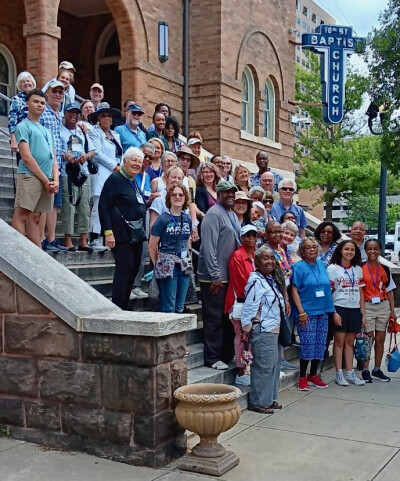JAF Civil Rights Pilgrimage: A Profound Faith Journey
Submitted by Foundry UMC and Asbury UMC
 “Injustice, inhumanity, white supremacy, death, love, courage, grace, hope, and restoration” were words frequently spoken and viscerally experienced the week of Juneteenth as congregants of three Washington churches visited civil rights sites in Alabama and Atlanta. Participants will reflect and report on their journey on August 10, at 12:30 p.m. at Foundry UMC, 16th and P Streets, NW, Washington, DC. The session is open to all who are interested to learn more.
“Injustice, inhumanity, white supremacy, death, love, courage, grace, hope, and restoration” were words frequently spoken and viscerally experienced the week of Juneteenth as congregants of three Washington churches visited civil rights sites in Alabama and Atlanta. Participants will reflect and report on their journey on August 10, at 12:30 p.m. at Foundry UMC, 16th and P Streets, NW, Washington, DC. The session is open to all who are interested to learn more.
The civil rights pilgrimage was born of conversation over the years by the senior pastors of John Wesley AME Zion, Asbury UMC, and Foundry UMC (JAF), an outgrowth of the continuing reconciliation among the three churches, linked by slavery and history, to build relationships and live into beloved community. For the 46 attendees, ages 14-86, the June 16-21 trip was an honest and painful examination of historical strife, spanning the realities of past and continuing sins, the importance of faith and community in nonviolent and constant struggle, and the roles, however seen or unseen, of individuals in their collective determination behind the civil rights movement.
The pilgrimage provided a challenge, as noted in the Legacy Museum’s literature, quoting Mary McLeod Bethune: “If we have the courage and tenacity of our forebears, who stood firmly like a rock against the lash of slavery, we shall find a way to do for our day what they did for theirs.”
The bus trip from Atlanta to Birmingham, Montgomery, Selma, and back to Atlanta was packed with destinations, experiences, and logistical gymnastics, a few of which are highlighted below:
- Atlanta: The historic Ebenezer Baptist Church, where Daddy King filled the pulpit, and the nearby tomb of Rev. Dr. Martin Luther King, Jr., and his wife Coretta Scott King, surrounded by a reflecting pool, and the King Center.
- Birmingham: 16th Street Baptist Church, where the four girls were killed by a Sunday School bombing in 1963, and Bethel Baptist Church, where Fred Shuttlesworth embodied tenacity and perseverance.
- Montgomery: Two days were not enough time to take in the historic sites as well as the three Legacy sites created by Bryan Stevenson’s Equal Justice Initiative (EJI), including the museum and memorial (opened in 2018) and the outdoor sculpture park (added in 2024).
- Juneteenth special: EJI’s two-hour midday celebration featured remarks by Bryan Stevenson and soul-filling choral music performed by the Jason Max Ferdinand Singers.
- Selma: Walk across the Edmond Pettus Bridge in Selma, AL, ending in prayer at Brown Chapel, where peaceful marchers for voting rights retreated on the infamous “Bloody Sunday” (March 7, 1965) from severe beatings and injuries from Alabama state troopers on foot and on horses.
Relationships within and across congregations were nurtured and deepened within the intergenerational, multi-racial group that included seven students from Asbury and Foundry. The multi-church session, as noted above, will include reflections, prayers, photos, and more. Foundry is located at 1500 16th Street, NW, Washington, DC 20036. On-street parking is available until 2:00 p.m.
